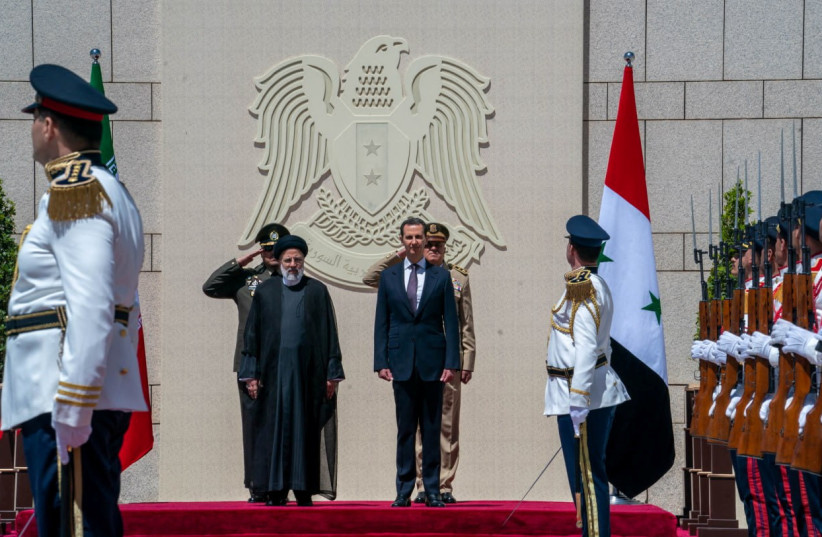Iran, a key ally of Syria’s regime, is showcasing its alliance with a visit by Iran’s President Ebrahim Raisi this week. He arrived in Damascus on Wednesday and will be in Syria for two days. His visit comes after Iran’s foreign minister also visited Lebanon and went to the Israeli border and threatened Israel.
In addition, Syria’s foreign minister was recently in Jordan for a meeting aimed at normalizing Syria’s relations with countries in the region.
Raisi’s visit is the first in 13 years for Iran’s President. Syria’s President, in contrast, has visited Iran. Iran supplies Syria with support and weapons. Iran has also sent militias and drones to Syria. Iran also traffics weapons via Syria to Hezbollah.
Much attention on the visit
The Iranian presidential visit is getting a lot of attention in pro-Iranian media, including pro-regime media in Iran and also online publications such as Al-Mayadeen. Iran has brought a large delegation to Syria, including officials involved in oil and economic issues.
The goal will be to sign deals with Syria to help it and Iran evade Western sanctions. Iran and Syria will seek to create an Iranian line of credit for Syria.

Iran’s foreign ministry has also indicated that the role of the visit is to push for “political, security and economic aspects, noting that it embodies the victory of the political will of the resistance and the success of government diplomacy in completing the process of regional integration.”
Al-Mayadeen has focused on Israeli coverage of the visit in order to portray this visit as a victory for Iran and also for Iran’s proxies. Iran has been entrenching itself in Syria and uses Syria to threaten Israel. For instance, Iran encouraged a Palestinian group to fire rockets at Israel the day after Passover, and it also flew a drone from Syria into Israeli airspace in early April. The drone was downed by Israel.
Raisi gave an interview on the eve of his trip. In the interview, the Iranian leader touched on many themes that the region in Tehran has been focused on recently. For instance, he discussed the importance of the Iran-Saudi deal that was recently brokered by China. He said that “Iran and Saudi Arabia are two prominent countries in the region, both have a political and social position and an important influence in the region, and the relationship between the two countries Iran and Saudi Arabia can be a significant relationship for the region and even at the global level.”
Iranian threats against Israel
The Iranians are also threatening Israel during the trip to Syria. Iran’s president believes that Israel and the US are no longer able to conclude new peace deals in the region or increase their influence. Iran believes that the current situation in the region is “determined by the Palestinian Mujahideen in the field. It means that today the initiative is in the hands of the Palestinian Mujahideen, and the Zionist regime has been defeated in all these wars, whether in the 33-day war, the 22-day war, the 8-day war or the 2-day war.”
These are references to conflicts that go back to the 2006 war between Israel and Hezbollah. Iran believes that Hezbollah and other “resistance” groups it backs are winning. “Today, we are witnessing the continuous decline of the Zionist regime and its supporters, and the resistance front is getting stronger day by day. You look at every part of the resistance front across the region, you see it is rising and improving and gaining strength,” the Iranian president said.
Iran once again warned Israel that even the “slightest action” by Israel would lead to the “destruction” of Israel Iran says its power in Syria is “not a secret.” Iran views Syria as the frontline of the “resistance front” and wants to use Syria as a launch pad against Israel. This means that while Syria wants to normalize with the Arab countries, Iran’s goals are different from Syria's. They may be at cross purposes. Iran wants to use Syria, while Syria’s regime wants stability. The US and Israel are also concerned about Iran’s threats from Syria.
The Iranian presidential visit is important and the deals that will be signed appear to be significant in terms of symbolism of the Iran-Syria alliance and its influence on neighboring countries.
